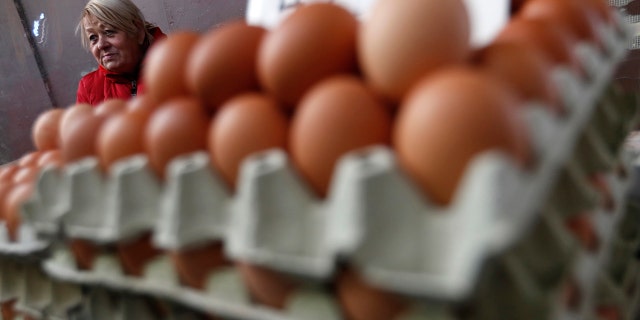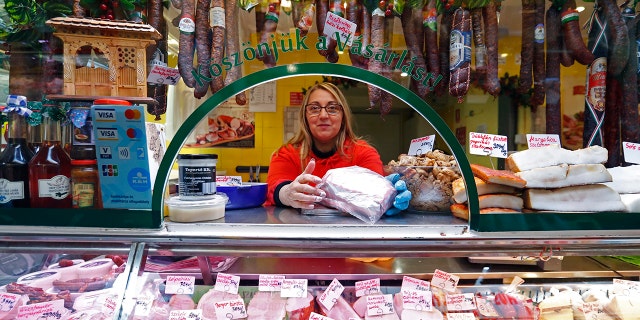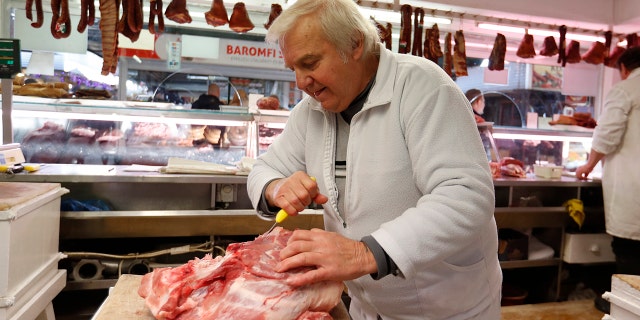Inflation surges globally, placing households and companies in a pinch
From equipment shops within the United States to meals markets in Hungary and fuel stations in Poland, rising client costs fueled by high energy costs and supply chain disruptions are placing a pinch on households and companies worldwide.
Rising inflation is main to cost will increase for meals, fuel and different merchandise and pushing many individuals to decide on between digging deeper into their pockets or tightening their belts. In growing economies, it is particularly dire.
“We have observed that we’re consuming much less,” Gabor Pardi, a client at an open-air meals market in Hungary’s capital, Budapest, mentioned after shopping for a sack of recent greens not too long ago. “We attempt to buy the most cost effective and most economical issues, even when they do not look nearly as good.”
NEW YORK TIMES COLUMNIST SAYS HE HAS ‘HIGH TOLERANCE’ FOR INFLATION IN ‘WHITE-HOT ECONOMY’

Vendor Judit Sos sells eggs in a meals market in Budapest, Hungary, on Nov. 20, 2021.
(AP Picture/Laszlo Balogh)
Almost two years into the COVID-19 pandemic, the financial affect of the disaster remains to be being felt even after international locations raced out of debilitating lockdowns and client demand rebounded. Now, another surge of infections and a new coronavirus variant, omicron, are main international locations to tighten their borders and impose different restrictions, threatening the worldwide financial restoration.
The reverberations are hitting central and Japanese Europe particularly onerous, the place international locations have a few of the highest inflation charges within the 27-nation European Union and persons are struggling to purchase meals or fill their gasoline tanks.
A butcher on the Budapest meals market, Ildiko Vardos Serfozo, mentioned she’s seen a drop in enterprise as clients head to multinational grocery chains that may provide reductions by shopping for in massive wholesale portions.
“Patrons are worth delicate and subsequently typically depart us behind, even when our merchandise are top quality. Cash talks,” she mentioned. “We discover that inflation is just not good for us. … I’m simply glad my children don’t wish to proceed this household enterprise, I don’t see a lot future in it.”
In close by Poland, Barbara Grotowska, a 71-year-old pensioner, mentioned exterior a reduction grocery store within the capital of Warsaw that she’s been hit hardest by her rubbish assortment price practically tripling to 88 zlotys ($21). She additionally lamented that the cooking oil she makes use of has gone up by a 3rd of its worth, to 10 zlotys ($2.40).
“That’s an actual distinction,” she mentioned.
The latest pickup in inflation has caught enterprise leaders and economists world wide unexpectedly.

A vendor sells meals objects at a meals market in Budapest, Hungary, on Nov. 20, 2021.
(AP Picture/Laszlo Balogh)
In spring 2020, the coronavirus crushed the worldwide financial system: governments ordered lockdowns, companies closed or slashed hours and households stayed residence. Corporations braced for the worst, canceling orders and laying aside investments.
In an try to stave off financial disaster, rich international locations — most notably the US — launched trillions of dollars worth of government aid, an financial mobilization on a scale unseen since World Battle II. Central banks additionally slashed rates of interest in a bid to revive financial exercise.
However these efforts to jump-start economies have had unintended penalties: as customers felt extra emboldened to spend the cash that they had acquired by authorities help or low-interest borrowing, and vaccine rollouts inspired folks to return to eating places, bars and retailers, the surge in demand examined the capability of suppliers to maintain tempo.
Ports and freight yards had been instantly clogged with shipments, and costs started to rise as world provide chains seized up — particularly as new outbreaks of COVID-19 generally shut down factories and ports in Asia.
The rise in costs has been dramatic. Inflation in the US surged to six.2% in October, the best since 1990, and the Worldwide Financial Fund predicts that world client costs will rise 4.3% this yr, the most important leap since 2011.
It’s most pronounced within the growing economies of central and Japanese Europe, with the best annual charges recorded in Lithuania (8.2%), Estonia (6.8%) and Hungary (6.6%). In Poland, certainly one of Europe’s fastest-growing economies, inflation got here in at 6.4% in October, the best price in twenty years.
A number of buyers at a vegetable stand in Warsaw mentioned they’re anxious about rising costs for staples like bread and cooking oil and expect the state of affairs to worsen within the new yr, when vitality costs are set to rise.
Piotr Molak, a 44-year-old vegetable vendor, mentioned he has not but needed to increase costs on the potatoes, apples or carrots he sells however the cherry tomatoes he imports from Spain and Italy, which he buys in euros, have gotten far costlier as Poland’s foreign money, the zloty, has weakened.
“We are going to principally really feel this within the new yr when electrical energy goes up,” Molak mentioned. “We’re actually going to really feel it when now we have to spend extra on our residence than on pleasure.”
The weakening of currencies throughout central and Japanese Europe towards the U.S. greenback and euro is pushing up the worth of imports and gasoline and exacerbating the pinch from provide backups and different components.
Hungary’s foreign money, the forint, has misplaced round 16% of its worth towards the greenback within the final six months and slipped to a historic low towards the euro final week. That is a part of a technique by Hungary’s central financial institution to maintain the nation aggressive and appeal to international corporations in search of low cost labor, mentioned Zsolt Balassi, a portfolio supervisor at Maintain Asset Administration in Budapest.
However costs on imported items have skyrocketed, and world oil costs set in U.S. {dollars} have pushed gasoline prices to file ranges.
“Because the Hungarian forint, and truly all regional currencies, are kind of consistently weakening, it will consistently increase oil costs in our currencies,” Balassi mentioned.
In response to file gasoline costs, which peaked this month at 506 forints ($1.59) for gasoline and 512 forints ($1.61) for diesel per liter, Hungary’s authorities introduced a 480-forint ($1.50) cap at filling stations.
Whereas giving some reduction, Hungary’s upcoming elections, wherein the right-wing governing occasion faces essentially the most severe problem because it was elected in 2010, had been possible an element, Balassi mentioned.
“That is clearly a political resolution which has large financial disadvantages, however in all probability it makes the households pleased,” he mentioned.
The political nature of some financial selections is just not restricted to Hungary.
Poland’s central financial institution, additionally going through a weakening foreign money, has been accused by critics of permitting inflation to rise too excessive for too lengthy to encourage financial progress and bolster assist for the ruling occasion.
The financial institution shocked markets with the timing and dimension of two base rate of interest hikes in October and November in a bid to ease costs, whereas Hungary’s central financial institution has raised charges in smaller increments six occasions this yr.
Nonetheless, if central banks transfer too aggressively too quickly to manage inflation, it may short-circuit the financial restoration, mentioned Carmen Reinhart, chief economist on the World Financial institution.
She worries about greater meals costs that primarily harm the poor in growing international locations, the place a disproportionate share of household budgets goes towards maintaining meals on the desk.

Vendor Misi Kovacs prepares the meat to promote in a meals market in Budapest, Hungary, Nov. 20, 2021.
(AP Picture/Laszlo Balogh)
“Meals costs are a barometer for social unrest,’’ Reinhart mentioned, noting that the Arab Spring uprisings that started in 2010 had been prompted partly by greater meals costs.
Anna Andrzejczak, a 41-year-old who works for an environmental basis in Poland, was nonetheless a baby when Communism ended there in 1989 and has solely a obscure reminiscence of the hyperinflation and different financial “tumult” that got here with the transition to a market financial system.
CLICK HERE TO GET THE FOX NEWS APP
However she feels the costs going up “each time I fill my tank,” with gasoline prices having risen some 35% within the final yr.
“We’ve had a interval of stability in previous years, so this inflation now could be an enormous shock,” Andrzejczak mentioned. “We don’t have the worth will increase that we had then, however I feel it will trigger large stress.”


